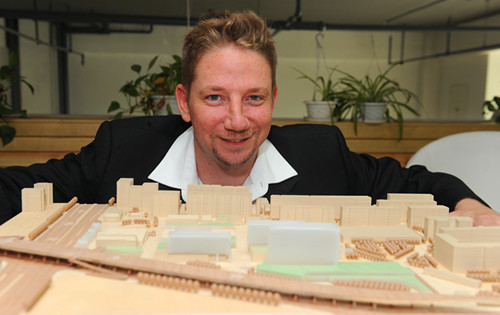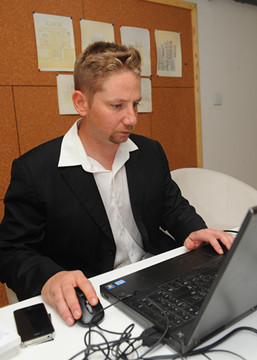Business
From up and Coming to Established: an expat's perspective on making it in China
By Parker Barriball (JIN Magazine)
Updated: 2012-08-10

Everyone remembers their first few months in China, it was exciting, sometimes frustrating, but I doubt it was boring. And yet some of us are still in the honeymoon stage of their China experience. Recently we sat down with Clay Vogel, an American expat with several years' experience in China and Tianjin to talk about his experiences working and living in China. He first came to China in 2004. We hope we can all learn a bit from someone who has been here for a few years, and get a more enlightened perspective of life in China to the new initiates into the Middle Kingdom Fraternity.
Could you tell us what brought you to China originally, and what has made you want to stay?
I originally worked for Smith Group from 2004 to 2006 and worked with them on various projects. At on point I headed back to America temporarily because the company was leaving the Chinese market. Although I was only in China for just six months, I had built a number of strong relationships with in the industry. I could really see the potential in the Chinese market and I was determined to stay. Through consulting and old contacts I was able to start my own company that I continue operating today.
Have you lived in other Chinese cities and how would you compare them to Tianjin?
When I first came to China and compared Shanghai, Beijing and Tianjin, I liked Tianjin the most. I felt that the circle was smaller in the sense that I could get around and do everything I wanted, and I did not have to rely on other people. My new favorite city at the moment is Changsha. It has a great mix, the way the city is laid out in terms of retail and the after work environment suits me.
What advice would have for foreigners looking to establish a career in China? What should a new expat do and avoid in their working life?
My situation is a little different to most expats, as I started my company in China. I think the best thing for me which helped me grow in China is that in the beginning it was only me. I had no other foreign friends or foreign interaction and so I had to embrace the Chinese culture. For many years I sat at tables drinking bai jiu and learned how to use chopsticks, absorbing and often thinking "What am I actually doing here in China?" The willingness to accept how things work in China, and being totally engulfed by the culture has given me many opportunities. Most people come to China with a company with other foreigners instead of coming 'alone'.
I always tell my foreign friends about how much fun I had by myself in China, meeting Chinese people, and learning about Chinese culture. My advice is to not to limit yourself to the foreign crowd. To be successful in China you must embrace both Chinese people and culture.
What is your impression of the business culture in China?
Business culture in China is unique in the sense that you really need to form guanxi. Relationships in business are important across the globe but more emphasis is placed on it here. In China, when having dinner with clients and drinking bai jiu people want to see your true face and see who you really are. I think this is very unique to business culture in China which I very much respect and enjoy.

In the architecture business there is great opportunity here. I do feel some aspects of doing business here is not as sophisticated as it should be. As a professional I should be leading the client, but I often find myself in a young company being led by the client.
The real estate industry is the most prosperous sector in China's economy. However, there are voices that object the mass construction of new skyscrapers. They think the modern buildings make all cities in China just look the same. As an architect, what do you think of the contradiction of modern construction and local character preservation? How does this apply to Tianjin?
Tianjin is a very unique city due to the strong concessions in the early 19th century. They have a wealth of established European architecture. It is simply a part of Tianjin history and I think people appreciate that. The modern construction which is occurring in Tianjin makes the city more culturally rich. I understand peoples' concern in the sense that tower after tower becomes the same, but this is a developing country and as fast as things go up in China things come down. The construction shows how prosperous China and Tianjin really are.
There is a huge market for classical or traditional design in Tianjin. We are finding this market niche to be very thriving, certain people simply find modern architecture unpleasing. And so in 2010 we brought on a class mate of mine, Ryan Moss who has a master's degree in classical design. He is taking the lead on classical architecture projects, the first of which is under construction in Hangu.
In my mind, architecture is a backdrop to space. It is very important within urban design that good spaces are formed where people can come together. A place where people can interact, share ideas and innovate, therefore making new things and making Tianjin more prosperous.
Will you continue your business in Tianjin?
Tianjin is a great market. It is an upper-tier city that has a lot of development potential. Tianjin is expecting huge growth over the next several years and so I personally want to see that my business grows here.
It is difficult however to hire quality architects in Tianjin. Tianjin has the top three architecture schools in China, but the talent pool is not here. People get educated here and leave, and so that makes it a challenge to attract good designers to our Tianjin office. Many skilled graduates go abroad in search of opportunity and to put themselves on a path to becoming a better architect.
What is your favorite and least favorite part of living and working in China?
A lot of people may criticize me for saying this, but looking at myself, my favorite thing about living and working in China is the professional freedom. I have lived in Poland, and China. In both of these countries I have more freedom and more opportunity than I do in America. If I were still in America now, I'd be waiting in line for the next ten years until I get my shot at becoming a partner at a design firm. Being in China, starting at 31 I had my shot. That's why I took a leap of faith and started my own company.
My least favorite thing about being in China is that often you can only do one thing per day. Such as going to meet a client, you always end up waiting around or being carried from place to place. You don't know whether you'll be there for two hours, the rest of the day. When you do business in China there's a lot of wasted time and inefficiencies, which becomes frustrating as you could be doing more productive things. There can never be a schedule; everything has to be played by ear. At least it makes things more interesting.
As we can see Clay's advice and perspective is not industry specific. Get out there in the culture without the safety net of foreign friends. Experience China and appreciate it for what it is, the good and the bad, and you just might be able to carve out a nice life for yourself here in China.
